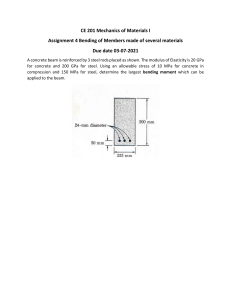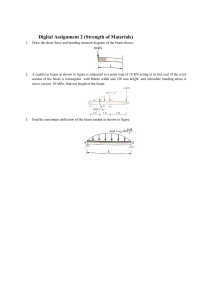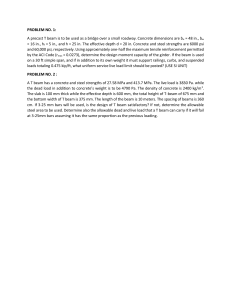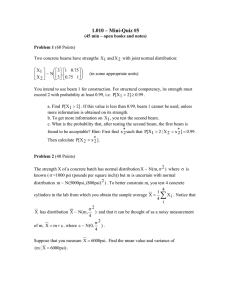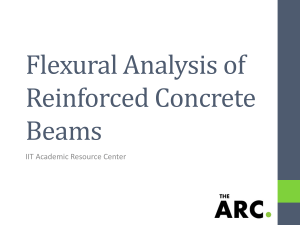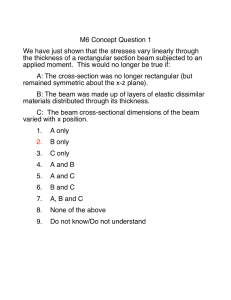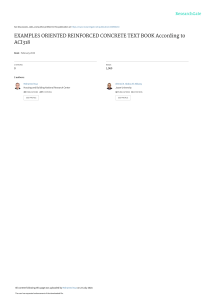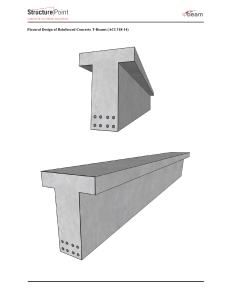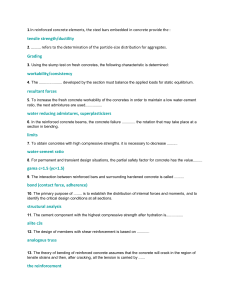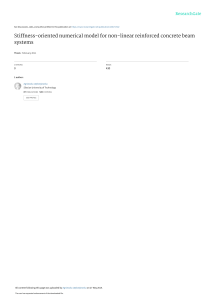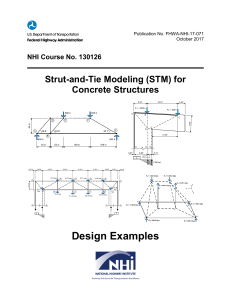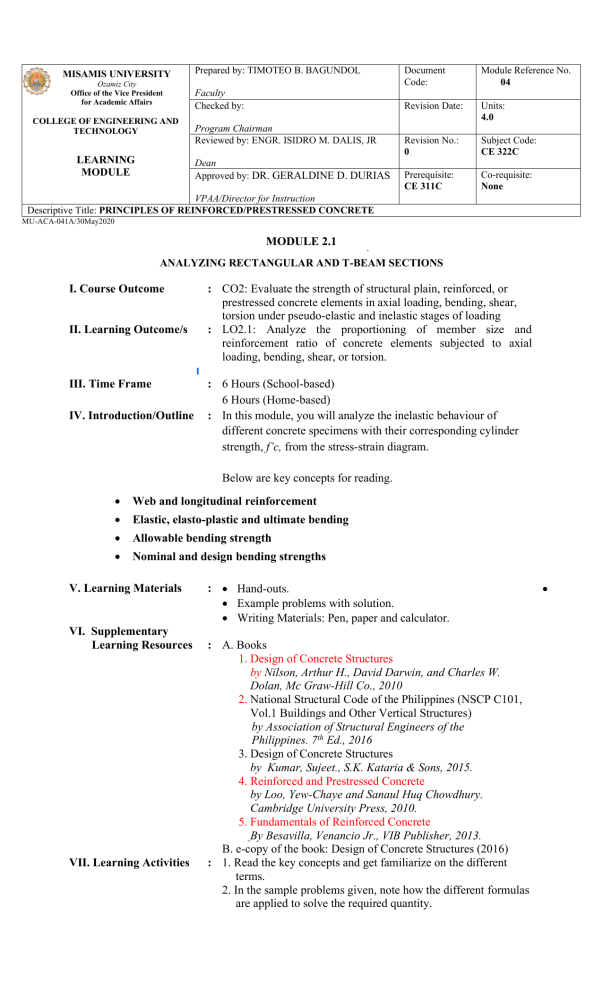
MISAMIS UNIVERSITY Ozamiz City Office of the Vice President for Academic Affairs COLLEGE OF ENGINEERING AND TECHNOLOGY LEARNING MODULE Prepared by: TIMOTEO B. BAGUNDOL Faculty Checked by: Program Chairman Reviewed by: ENGR. ISIDRO M. DALIS, JR Dean Approved by: DR. GERALDINE D. DURIAS Document Code: Module Reference No. 04 Revision Date: Units: 4.0 Revision No.: 0 Subject Code: CE 322C Prerequisite: CE 311C Co-requisite: None VPAA/Director for Instruction Descriptive Title: PRINCIPLES OF REINFORCED/PRESTRESSED CONCRETE MU-ACA-041A/30May2020 MODULE 2.1 ANALYZING RECTANGULAR AND T-BEAM SECTIONS I. Course Outcome II. Learning Outcome/s III. Time Frame IV. Introduction/Outline : CO2: Evaluate the strength of structural plain, reinforced, or prestressed concrete elements in axial loading, bending, shear, torsion under pseudo-elastic and inelastic stages of loading : LO2.1: Analyze the proportioning of member size and reinforcement ratio of concrete elements subjected to axial loading, bending, shear, or torsion. : 6 Hours (School-based) 6 Hours (Home-based) : In this module, you will analyze the inelastic behaviour of different concrete specimens with their corresponding cylinder strength, f’c, from the stress-strain diagram. Below are key concepts for reading. • Web and longitudinal reinforcement • Elastic, elasto-plastic and ultimate bending • Allowable bending strength • Nominal and design bending strengths V. Learning Materials VI. Supplementary Learning Resources VII. Learning Activities : • Hand-outs. • Example problems with solution. • Writing Materials: Pen, paper and calculator. : A. Books 1. Design of Concrete Structures by Nilson, Arthur H., David Darwin, and Charles W. Dolan, Mc Graw-Hill Co., 2010 2. National Structural Code of the Philippines (NSCP C101, Vol.1 Buildings and Other Vertical Structures) by Association of Structural Engineers of the Philippines. 7th Ed., 2016 3. Design of Concrete Structures by Kumar, Sujeet., S.K. Kataria & Sons, 2015. 4. Reinforced and Prestressed Concrete by Loo, Yew-Chaye and Sanaul Huq Chowdhury. Cambridge University Press, 2010. 5. Fundamentals of Reinforced Concrete By Besavilla, Venancio Jr., VIB Publisher, 2013. B. e-copy of the book: Design of Concrete Structures (2016) : 1. Read the key concepts and get familiarize on the different terms. 2. In the sample problems given, note how the different formulas are applied to solve the required quantity. • VIII. Equipment IX. Student Feedback 3. Answer “Activities 1 and 2” of this module and write solution in a long white bond paper, picture it and send thru email at timbag2005@yahoo.com anytime during our home-based session and the hard copy of the solution will be submitted during our next face-to-face meeting. : None : Your feedback is important. Please don’t leave this blank. This portion will allow us to evaluate how this module is going. Your feedback will help improve this module for future revision. 1. Which part of this module you found interesting? Why? 2. Which part of this module you considered challenging? Why? Activity 1: Singly-reinforced rectangular beam (60 pts.) A rectangular beam has a width 300 mm and an effective depth of 387.5 mm is reinforced with 4-25 mm ø corrugated bars. f’c = 24.13 MPa, fy = 413.7 MPa. a) Compute the balanced steel ratio b) Compute the tension reinforcement index c) Compute the nominal moment capacity of the beam Activity 2: Doubly-reinforced rectangular beam (60 pts.) A rectangular beam has a width of 300 mm and an effective depth to the centroid of the tension reinforcement of 500 mm. The tension reinforcement consist of 6-25 mm ø bars placed in two rows. Compression reinforcement consisting of 2-25 mm ø bars placed 62.5 mm from the compression face of the beam. f’c = 27.58 MPa, fy = 413.7 MPa. a) Determine the depth of the compression block b) Determine the maximum steel ratio c) Determine the design moment capacity of the beam Handouts/ Reading Materials NOTE: Hard copy of handouts/reading materials will be made available to the students for reproduction.
